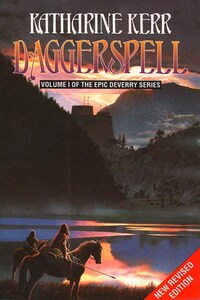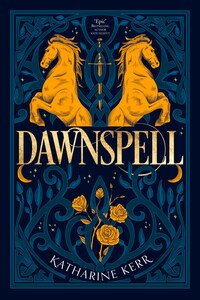Voyager
KATHARINE KERR
Dragonspell
The Southern Sea
The fool sees peaks rising above the water and says, ‘Look, many islands!’
The wise man knows that all are connected under the Southern Sea.
The Secret Book of Cadwallon the Druid
Voyager
An Imprint of HarperCollinsPublishers
77–85 Fulham Palace Road,
Hammersmith, London W6 8JB
www.harpercollins.co.uk
First published in Great Britain by GraftonBooks 1990
Copyright © Katharine Kerr 1990
Katharine Kerr asserts the moral right to be identified as the author of this work
This novel is published in the United States of America under the title The Dragon Revenant
A catalogue copy of this book is available from the British Library.
This novel is entirely a work of fiction. The names, characters and incidents portrayed in it are the work of the author’s imagination. Any resemblance to actual persons, living or dead, events or localities is entirely coincidental.
All rights reserved under International and Pan–American Copyright Conventions. By payment of the required fees, you have been granted the nonexclusive, nontransferable right to access and read the text of this e-book on-screen. No part of this text may be reproduced, transmitted, downloaded, decompiled, reverse–engineered, or stored in or introduced into any information storage and retrieval system, in any form or by any means, whether electronic or mechanical, now known or hereafter invented, without the express written permission of HarperCollins e–books.
HarperCollinsPublishers has made every reasonable effort to ensure that any picture content and written content in this ebook has been included or removed in accordance with the contractual and technological constraints in operation at the time of publication.
Source ISBN: 9780586207871
Ebook Edition © AUGUST 2014 ISBN: 9780007391455
Version: 2014–08–18
In memory of
Howard ‘Jake’ Jacobsen
1934–1988
He is, and will be, sorely missed.
Over the past few years, readers have asked me various questions about the Deverry series. Usually these questions are asked in noisy rooms at conventions where no one can really hear the answers, but now my publishers have kindly given me a chance to answer some of them in print, where it’s always quiet. The two things you all most want to have clarified, it seems, are the kind of magic the characters use and the way I’ve organized the books.
Deverry dweomer is very loosely based on the ‘real magic’ of the Western tradition, a field of study that can best be defined, perhaps, through its history. First, though, let me define one thing that magic isn’t, popular belief and oft-repeated clichés to the contrary. Magic is most emphatically not a substitute for technology nor is it the equivalent of technology. No more will the true magician study it only for personal gain. As a very wise man recently defined it, ‘Magic is the art of producing changes in consciousness at will and of using these changes to expand the consciousness of all humanity.’ Notice the emphasis on consciousness here. This is not to say that magic never produces any effects in the so-called ‘real’ or physical world – quite the contrary – simply that in true magic, consciousness is always central and these physical effects secondary. In Deverry, since I’m writing adventure stories first and foremost, the physical effects are quite spectacular, but this is one reason that I say the magic is very loosely based upon the Western tradition.
What is this tradition, then? Over the past two thousand years, thanks to the invective of the various churches and more recently of the scientific community, magic has had to lie hidden in the West, practised in secret, persecuted in public whenever the inquisitors got wind of it, and because of that persecution what should be an organized body of philosophical thought and spiritual practice has become maimed and garbled, conflated in the popular mind with superstition, devil worship, and the tricks and silly stories of con men and hucksters. In Asia, where no one organized religion ever got the whip hand over the soul of humanity, the situation is different. Most of you know about Yoga, for instance, a truly spiritual discipline reaching back thousands of years, or have heard about the monastic life of Buddhism and the intense spiritual insights and powers that its devotees attain after years of meditation. Western magic should have been no less.
Let me say here that when I talk about Europe and Asia, I don’t mean to deny the existence of the native spriritual systems of Africa and the Americas. I simply don’t know enough about them to discuss them intelligently. The roots of all these spiritual disciplines, however, including what should have been the European, probably lie in some common ground: the developing shamanism of Palaeolithic hunters some fifteen thousand years ago, or maybe even further back than that – I doubt very much that anyone will ever know, and you should all be extremely sceptical of anyone who says they do, particularly if these claims involve flying saucers, the lost continent of Atlantis, or other such sensational plot elements. What we do know is that by the time the art of writing was slowly spreading through the Eurasian continent, round about 2000 BC or so, shamanism had developed into a vast variety of spiritual practices, which in Asia had the good fortune to become firmly woven into the religious life of their cultures.














